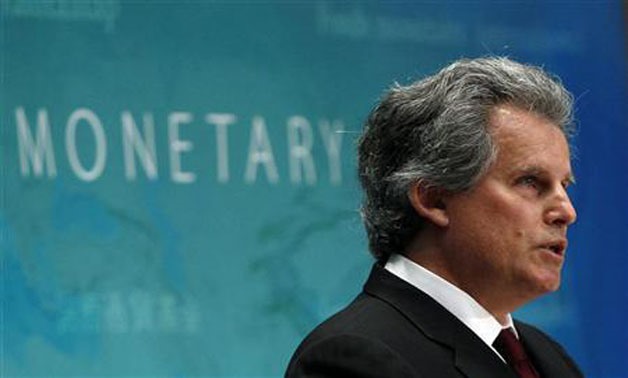
International Monetary Fund (IMF) First Deputy Managing Director David Lipton speaks during a news conference in Tokyo June 12, 2012. REUTERS/Issei Kato
CAIRO – 8 May 2018: Egypt’s reforms have started to reap results, especially with regard to Egypt’s macroeconomic stabilization: growth is at the highest rate since 2008, inflation has rapidly declined, foreign exchange reserves are at record levels, exports are growing and unemployment has declined, First Deputy Managing Director of the International Monetary Fund (IMF) David Lipton said.
This came after his meeting with President Abdel Fatah el-Sisi in Cairo on Monday.
During the meeting, both sides discussed the outcome of the Inclusive Growth and Job Creation Conference that was held in Cairo from May 5-6 and co-organized by the Egyptian authorities and the IMF.
“I was encouraged by the determination, shared by policy makers, the private sector, members of the parliament and civil society. There was consensus that Egypt needs to lock in the gains in macroeconomic stabilization and shift gears towards the implementation of a home-grown structural reform agenda to achieve more inclusive and private sector-led growth,” Lipton said in a released statement.
He said that this will help create jobs, which is the best way to reduce poverty and improve living standards.
“I thanked President Sisi, Prime Minister Sherif Ismail, Governor of the Central Bank of Egypt Tarek Amer and the Minister of Finance Amr El Garhy for co-hosting the conference. As we continue our partnership, we stand ready to help Egypt achieve a better future for its people,” Lipton said.
A delegation from the IMF is currently visiting Egypt to review progress on economic reforms. The review is necessary before the IMF disperses the fourth tranche of the $12 billion loan deal.
In December 2017, Cairo received the third tranche of the loan, worth $2 billion. The fourth disbursement will bring the total Egypt has received so far to $8 billion.
Egypt clinched a $12 billion loan deal with the IMF in late 2016, shortly after the country floated its local currency. This came as part of a reform program that also included cutting energy subsidies and introducing new taxes.

Comments
Leave a Comment